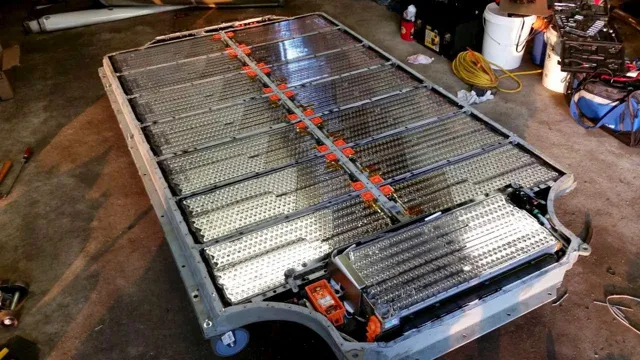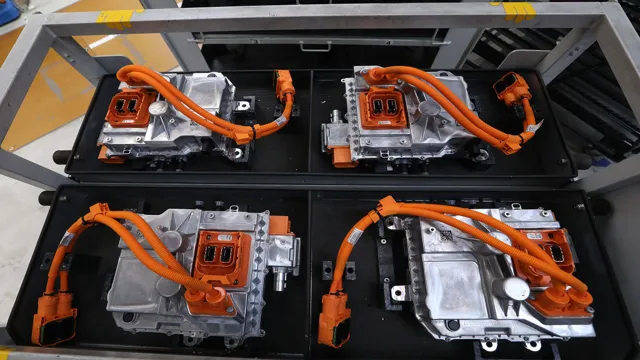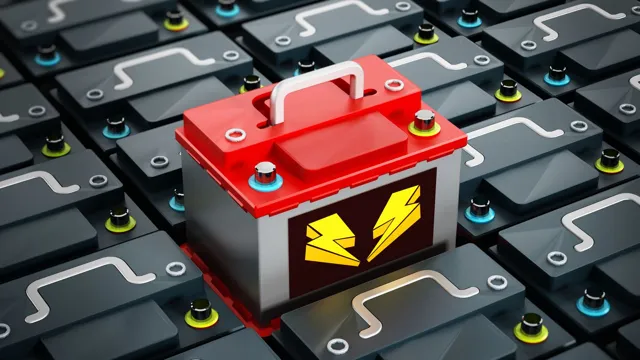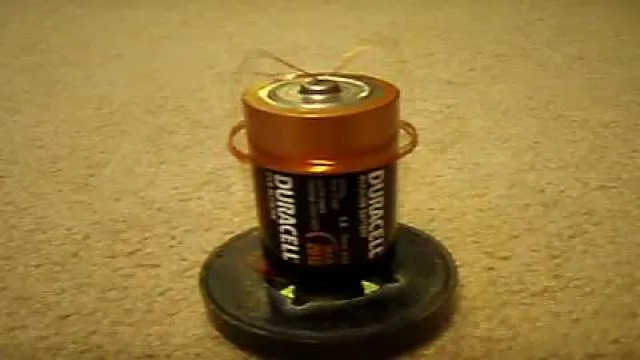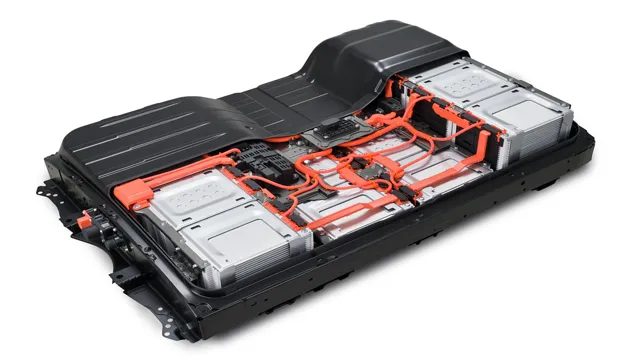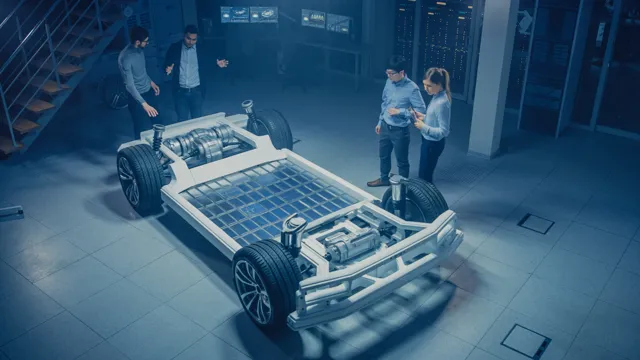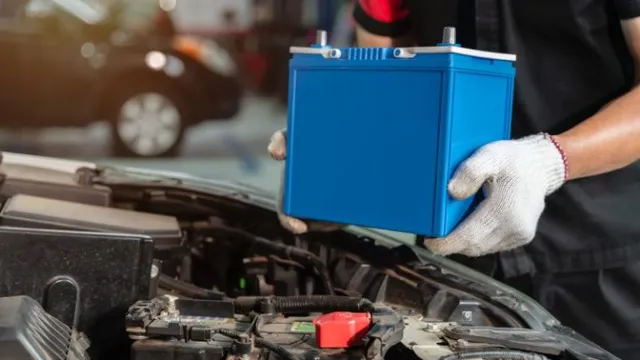The Powerhouse Behind Tesla’s Electric Performance: The Evolution of Battery Technology
Have you ever driven by a Tesla and wondered how it manages to run solely on electricity? The answer lies within its battery. Tesla batteries are not your average AA batteries that power your remote control – they are powerful enough to propel a car forward. But how do they work? These batteries are made up of thousands of small cells that work together to store energy.
When the car is in use, these cells discharge their stored energy, powering the electric motor. But why use a battery instead of gasoline? For one, the environmental benefits are undeniable – electric cars produce zero emissions, making them much cleaner than traditional gasoline-powered cars. In addition, electric cars are often cheaper to operate in the long run, as electricity is a more cost-effective source of energy compared to gasoline.
So next time you see a Tesla zooming down the road, remember that it’s powered by a battery that’s a modern engineering feat.
Introduction
Battery technology plays a pivotal role in the electric vehicle industry, and the battery used in Tesla electric cars is no exception. Tesla vehicles utilize lithium-ion batteries, which were developed to store more energy and last longer than traditional lead-acid ones. These batteries consist of thousands of small cells, each containing a positive and negative electrode separated by a thin layer of electrolyte.
A complex control system manages the entire battery pack, ensuring optimal performance while maintaining safety. The battery pack is also designed to work in conjunction with regenerative braking, allowing the electric motor to convert wasted energy into electricity and feeding it back to the battery for later use. With a range of up to 400 miles on a single charge, the battery in Tesla electric cars is a key factor in their success and popularity.
As battery technology continues to evolve, we can expect even better performance and longer ranges in the near future.
The Lithium-ion Battery Revolution
The lithium-ion battery revolution is rapidly changing the world we live in, from the way we power our cars to the devices we use on a daily basis. This new technology is allowing us to achieve unprecedented levels of efficiency and reliability, and it’s changing the way we think about energy storage. With lithium-ion batteries, we are able to store more energy in a smaller space, making everything from electric vehicles to smartphones more powerful and long-lasting.
This has huge implications for our environment, as well, since it means we’ll be able to rely less on fossil fuels and more on renewable energy sources. As this technology continues to evolve, we can expect to see even more groundbreaking applications in the years ahead. So if you’re looking to stay ahead of the curve, be sure to keep an eye on the lithium-ion battery revolution – it’s only going to get bigger and better from here!
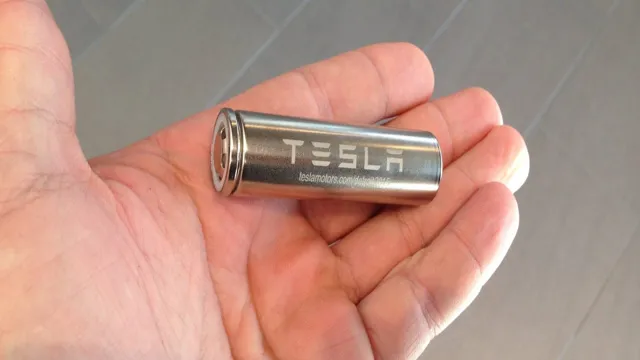
Why Tesla Uses Lithium-ion Batteries
Tesla is one of the most innovative electric vehicle manufacturers today, and their primary source of energy storage is lithium-ion batteries. This is because these batteries have several advantages over other types of batteries, such as their high energy density, low self-discharge rate, and longer lifespan. Lithium-ion batteries can also be charged quickly and efficiently, making them essential for electric cars.
Moreover, their compact size makes them ideal for vehicle use, ensuring that the car’s weight is not affected. Additionally, their rechargeable nature means that they are an eco-friendly alternative to non-rechargeable batteries, thus making them a more sustainable option for powering electric vehicles. Ultimately, their energy efficiency and reliability have made them the preferred choice for the world’s leading electric vehicle manufacturer.
Tesla’s Battery Technology
When it comes to electric vehicles, one of the most important components is the battery, and in the case of Tesla electric cars, the battery technology is top-notch. Tesla uses a unique battery chemistry, known as lithium-ion phosphate, which offers several advantages over traditional lithium-ion batteries. For example, these batteries are more durable, safer, and have a longer lifespan.
They also have a higher energy density, which means they can store more energy in a smaller space, allowing for a longer driving range. Additionally, Tesla’s batteries are designed to be integrated into the vehicle’s structure, contributing to the car’s overall strength and structural integrity. This, in turn, helps the electric car to achieve impressive safety ratings, making it both an efficient and a secure mode of transportation.
Thanks to Tesla’s innovative battery technology, electric vehicles are becoming more and more popular, and it is likely that other car manufacturers will follow Tesla’s lead and invest in their own battery research and development to compete with this cutting-edge technology.
The Gigafactory: Tesla’s Battery Production Facility
Tesla’s battery technology is one of the key driving forces behind their success. The company’s commitment to sustainability and renewable energy has led them to develop some of the most advanced batteries on the market. Their batteries are made from high-quality materials and are designed to be energy-efficient, long-lasting, and reliable.
Tesla’s batteries are also modular, which means they can be easily replaced or upgraded as needed. Perhaps the most exciting aspect of Tesla’s battery technology is the potential for it to revolutionize the energy industry. With the introduction of the Tesla Powerwall, individuals and businesses can now store their own energy at home or work and reduce their reliance on the traditional power grid.
This opens up new opportunities for renewable energy sources like wind and solar, which may not always be available at the time they are needed. Overall, Tesla’s battery technology is a game-changer and holds immense promise for a sustainable future.
The Tesla Model S Battery: Features and Specs
The Tesla Model S is equipped with an impressive battery technology that sets it apart from other electric vehicles in the market. The battery pack is composed of thousands of lithium-ion cells arranged in a massive array that provides power to the car’s electric motor. Tesla’s battery technology is revolutionary in numerous aspects from the size to the performance metrics.
It can drive the Model S for 400 miles on a single charge, which is a significant improvement compared to other electric cars. Further, it can charge up to 80% in as little as 40 minutes using Tesla’s Supercharger network. The battery is also equipped with impressive safety features, including flame retardant materials and a cooling system that protects against overheating.
Overall, the Tesla Model S battery technology provides the car with exceptional power and range while maintaining safety and reliability.
Battery Lifespan and Maintenance
When it comes to electric vehicles, battery lifespan and maintenance is a top concern for potential buyers. Fortunately, Tesla’s battery technology is designed to last for hundreds of thousands of miles, with some models boasting up to a 500-mile range on a single charge. Tesla uses a combination of lithium-ion cells, which are similar to those found in laptops and smartphones, but with larger and more durable packaging.
Additionally, Tesla’s batteries are liquid-cooled, providing optimal temperature management and extending their lifespan. To maintain your Tesla’s battery, it’s important to keep it charged between 20-80% and avoid leaving it in extreme temperatures. Tesla also offers remote diagnostic tools, which allow them to monitor battery health and alert you if any maintenance is required.
Overall, Tesla’s battery technology offers reliability and longevity, ensuring that your electric vehicle remains efficient and effective for years to come.
The Future of Tesla Batteries
The battery used in Tesla electric cars has come a long way since the company’s inception. Tesla has been at the forefront of the electric car movement, and their batteries have been a major factor in their success. In the past, Tesla batteries were expensive and had limited range, but with advancements in technology, they have become more affordable and efficient.
The latest Tesla battery, the 4680, is a game-changer. It is larger and has higher energy density, which means it can store more energy in a smaller space. This will allow for longer driving ranges and faster charging times.
The new batteries also have fewer parts, making them easier to manufacture and lowering the cost. With these advancements, Tesla is on track to produce a fully electric, affordable car for the mass market. The battery used in Tesla electric cars is a critical piece of technology that will shape the future of the automotive industry.
Innovations in Battery Technology for Electric Cars
Tesla is one of the fastest-growing electric vehicle (EV) manufacturers in the world, and battery technology is one of their primary areas of focus. Tesla’s batteries are designed to last for many years and provide consistent performance, without the need for any maintenance or replacement. However, the company is continuously improving its battery technology, which has resulted in a reduction in battery costs and improved range.
Elon Musk, founder and CEO of Tesla, has stated that their new battery technology will allow their EVs to travel up to 620 miles on a single charge, which would make them the longest-range EVs on the market. This achievement is largely due to the innovative approach taken by Tesla’s battery engineers, who are using a novel approach to battery design and manufacturing to make batteries more efficient, durable, and safer. With the introduction of Tesla’s latest battery technology, many consumers are likely to opt for an electric vehicle, and the era of gasoline-powered cars may finally come to an end.
Tesla’s Plans for Increasing Battery Range and Efficiency
Tesla has been working hard to increase the range and efficiency of their batteries. The company’s plans involve advancements in battery cell technology, manufacturing processes, and energy management. One of their most recent announcements is the development of the new “4680” battery cell that promises five times more energy capacity and six times more power than their previous cells.
This breakthrough could lead to significant improvements in vehicle performance, allowing for longer ranges and faster acceleration. Furthermore, Tesla is looking into ways to make their batteries more sustainable by reducing the use of cobalt and increasing the use of nickel, which is cheaper and more readily available. Additionally, the company is investing in renewable energy sources and grid storage solutions to promote the adoption of electric vehicles worldwide.
With these efforts, Tesla is set to remain at the forefront of the EV industry, while also contributing to a cleaner and more sustainable future.
Conclusion
In conclusion, the battery used in Tesla electric cars can truly be called a game-changer. With its impressive energy and power density, it has revolutionized the world of sustainable transportation. It is the backbone of Tesla’s mission to accelerate the world’s transition to sustainable energy and has electrified the automotive industry.
It’s safe to say that Tesla’s battery is not just a source of power, but a symbol of innovation, efficiency, and progress. So next time you see a Tesla on the road, remember that it’s more than just a car, it’s a technological marvel, fueled by the most advanced battery on the planet. “
FAQs
What type of battery is used in Tesla electric cars?
Tesla electric cars use lithium-ion batteries.
How long does the battery in a Tesla electric car last?
The battery life in a Tesla electric car depends on several factors, including usage and maintenance. Typically, a Tesla battery can last up to 300,000-500,000 miles before needing to be replaced.
How does Tesla ensure the safety of their battery systems?
Tesla uses several safety features in their battery systems, including firewalls between individual battery cells, a liquid cooling system to regulate battery temperature, and automatic systems to shut off the battery in case of a malfunction.
Can you replace the battery in a Tesla electric car?
Yes, Tesla offers battery replacement services for their electric cars. However, the cost of battery replacement can vary depending on the specific model and age of the vehicle.

